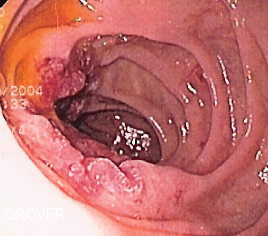Small intestine cancer
Editor-In-Chief: Prab R Tumpati, MD
Obesity, Sleep & Internal medicine
Founder, WikiMD Wellnesspedia &
W8MD medical weight loss NYC and sleep center NYC
| Small intestine cancer | |
|---|---|

| |
| Synonyms | N/A |
| Pronounce | N/A |
| Specialty | N/A |
| Symptoms | Abdominal pain, weight loss, nausea, vomiting, intestinal bleeding |
| Complications | Metastasis, bowel obstruction |
| Onset | Typically in adulthood |
| Duration | Varies |
| Types | Adenocarcinoma, carcinoid tumor, gastrointestinal stromal tumor, lymphoma |
| Causes | Genetic mutations, diet, smoking, alcohol consumption |
| Risks | Family history, Crohn's disease, celiac disease, Peutz-Jeghers syndrome |
| Diagnosis | Endoscopy, biopsy, CT scan, MRI |
| Differential diagnosis | Colon cancer, appendicitis, Crohn's disease |
| Prevention | Healthy diet, regular screening for high-risk individuals |
| Treatment | Surgery, chemotherapy, radiation therapy |
| Medication | Chemotherapeutic agents, targeted therapy |
| Prognosis | Depends on stage and type |
| Frequency | Rare |
| Deaths | Varies by region and stage |
Small Intestine Cancer is a rare disease in which malignant (cancer) cells form in the tissues of the small intestine. The small intestine is part of the body’s digestive system, which also includes the esophagus, stomach, and large intestine.
Types of Small Intestine Cancer[edit | edit source]
There are several types of small intestine cancer. The types of cancer found in the small intestine are adenocarcinoma, sarcoma, carcinoid tumors, gastrointestinal stromal tumor, and lymphoma.
Risk Factors[edit | edit source]
Certain factors increase the risk of developing small intestine cancer. These include celiac disease, Crohn's disease, familial adenomatous polyposis, and Peutz-Jeghers syndrome.
Symptoms[edit | edit source]
Common symptoms of small intestine cancer include abdominal pain, weight loss, and anemia. However, these symptoms may also be caused by other conditions.
Diagnosis[edit | edit source]
Small intestine cancer is often difficult to diagnose because the small intestine is a difficult organ to examine. Diagnosis may involve a physical exam, laboratory tests, imaging tests, and a biopsy.
Treatment[edit | edit source]
Treatment for small intestine cancer depends on the type of cancer, the stage of the cancer, and the patient's overall health. Treatment options include surgery, radiation therapy, and chemotherapy.
Prognosis[edit | edit source]
The prognosis for small intestine cancer depends on the type and stage of the cancer, the patient's overall health, and the patient's response to treatment.
See Also[edit | edit source]
References[edit | edit source]
Search WikiMD
Ad.Tired of being Overweight? Try W8MD's physician weight loss program.
Semaglutide (Ozempic / Wegovy and Tirzepatide (Mounjaro / Zepbound) available.
Advertise on WikiMD
|
WikiMD's Wellness Encyclopedia |
| Let Food Be Thy Medicine Medicine Thy Food - Hippocrates |
Translate this page: - East Asian
中文,
日本,
한국어,
South Asian
हिन्दी,
தமிழ்,
తెలుగు,
Urdu,
ಕನ್ನಡ,
Southeast Asian
Indonesian,
Vietnamese,
Thai,
မြန်မာဘာသာ,
বাংলা
European
español,
Deutsch,
français,
Greek,
português do Brasil,
polski,
română,
русский,
Nederlands,
norsk,
svenska,
suomi,
Italian
Middle Eastern & African
عربى,
Turkish,
Persian,
Hebrew,
Afrikaans,
isiZulu,
Kiswahili,
Other
Bulgarian,
Hungarian,
Czech,
Swedish,
മലയാളം,
मराठी,
ਪੰਜਾਬੀ,
ગુજરાતી,
Portuguese,
Ukrainian
Medical Disclaimer: WikiMD is not a substitute for professional medical advice. The information on WikiMD is provided as an information resource only, may be incorrect, outdated or misleading, and is not to be used or relied on for any diagnostic or treatment purposes. Please consult your health care provider before making any healthcare decisions or for guidance about a specific medical condition. WikiMD expressly disclaims responsibility, and shall have no liability, for any damages, loss, injury, or liability whatsoever suffered as a result of your reliance on the information contained in this site. By visiting this site you agree to the foregoing terms and conditions, which may from time to time be changed or supplemented by WikiMD. If you do not agree to the foregoing terms and conditions, you should not enter or use this site. See full disclaimer.
Credits:Most images are courtesy of Wikimedia commons, and templates, categories Wikipedia, licensed under CC BY SA or similar.
Contributors: Prab R. Tumpati, MD






